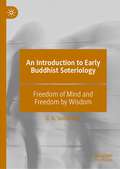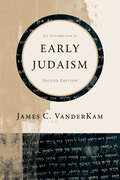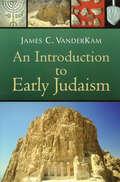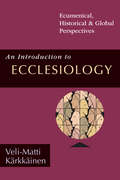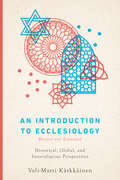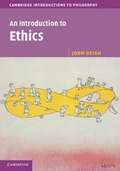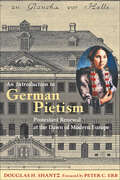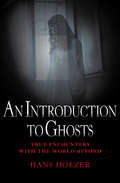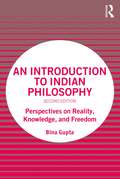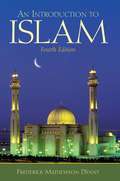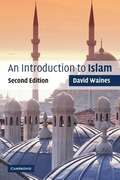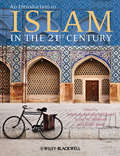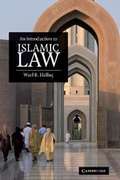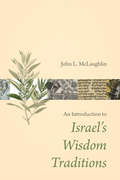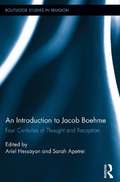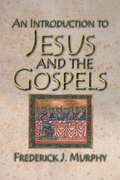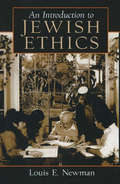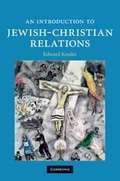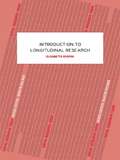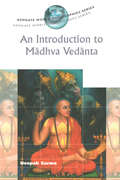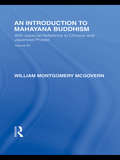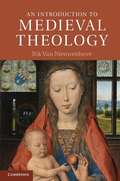- Table View
- List View
An Introduction to Design Arguments
by Benjamin C. JantzenThe history of design arguments stretches back to before Aquinas, who claimed that things which lack intelligence nevertheless act for an end to achieve the best result. Although science has advanced to discredit this claim, it remains true that many biological systems display remarkable adaptations of means to ends. Versions of design arguments have persisted over the centuries and have culminated in theories that propose an intelligent designer of the universe. This volume is the only comprehensive survey of 2,000 years of debate, drawing on both historical and modern literature to identify, clarify, and assess critically the many forms of design argument for the existence of God. It provides a neutral, informative account of the topic from antiquity to Darwin, and includes concise primers on probability and cosmology. It will be of great value to upper-level undergraduates and graduates in philosophy of religion, theology, and philosophy of science.
An Introduction to Early Buddhist Soteriology: Freedom of Mind and Freedom by Wisdom
by G. A. SomaratneThe book offers a comprehensive discussion on the Buddhist liberation and meditation concepts based on the original Pāli scriptures of Theravāda Buddhism. It interprets the early Buddhist soteriology critically and sympathetically by interweaving the Buddhological and the Buddhistic debates on understanding the Buddha’s original teaching on bondage, liberation, liberated ones, and meditation. It showcases the liberal and pluralistic character of early Buddhist soteriology by interpreting it psychologically through the lens of the Buddha's recognition of two sets of psychosomatic and epistemic mental configurations active in the human mind. It shows how this dualism pervades the early Buddhist soteriology by pointing out its recognition of craving and ignorance as two causes of suffering; the emancipation of mind and the emancipation by wisdom as two constituents of liberation; and the meditative appeasing and the meditative watching as two methods to attain that liberation. It demonstrates how the Buddha structures a gradual path to liberation enabling individuals to experience many temporary and irreversible secondary goals along the way and allowing them to join the path at any stage appropriate to their temperaments and advancement at a given time and space. The book therefore serves the students and scholars of Buddhism, religion, and psychology to obtain a comprehensive and insightful introduction to Buddhist soteriology.
An Introduction to Early Judaism
by James C. VanderkamBased on the best archaeological research, this volume explores the history of Judaism during the Second Temple period (516 BCE–70 CE), describing the body of Jewish literature written during these centuries and the most important groups, institutions, and practices of the time. Particularly interesting are VanderKam&’s depiction of events associated with Masada and, more briefly, the Bar Kokhba revolt—as well as his commentary on texts unearthed in places like Elephantine and Qumran. Now in its second edition, with additional material and updated throughout, this book remains the preeminent guide to early Judaism for anyone looking for a text that is concise and accessible while still comprehensive—and written by one of the foremost experts in the field.
An Introduction to Early Judaism
by James C. VanderkamOne of today's most respected scholars of biblical history and the Dead Sea Scrolls, James C. VanderKam here offers a superb new introduction to early Judaism.Based on the best, most recent archaeological research, this illustrated volume explores the history of Judaism during the Second Temple period (516 B.C.E. - 70 C.E.), describing the body of Jewish literature written during these centuries and the most important groups, institutions, and practices of the time. Particularly interesting are VanderKam's depiction of events associated with Masada and the Kokhba revolt, and his commentary on texts unearthed in places like Elephantine, Egypt, and Qumran.Written in the same accessible style as VanderKam's widely praised Dead Sea Scrolls Today, this volume provides the finest classroom introduction to early Judaism available.
An Introduction to Ecclesiology: Ecumenical, Historical & Global Perspectives
by Veli-Matti KärkkäinenchurchAn Introduction to Ecclesiology
An Introduction to Ecclesiology: Historical, Global, and Interreligious Perspectives
by Veli-Matti Kärkkäinenmajor theological traditions, including Eastern Orthodox, Roman Catholic, Reformed, and Pentecostalecclesiological insights from Latin American, Africa, and Asiadistinct perspectives from women, African Americans, and recent trends in the United Stateskey elements of the church such as mission, governance, worship, and sacramentsinterreligious comparison with Jewish, Islamic, Hindu, and Buddhist communities
An Introduction to Ethics
by John DeighThis book examines the central questions of ethics through a study of theories of right and wrong that are found in the great ethical works of Western philosophy. It focuses on theories that continue to have a significant presence in the field. The core chapters cover egoism, the eudaimonism of Plato and Aristotle, act and rule utilitarianism, modern natural law theory, Kant's moral theory, and existentialist ethics. Readers will be introduced not only to the main ideas of each theory but to contemporary developments and defenses of those ideas. A final chapter takes up topics in meta-ethics and moral psychology. The discussions throughout draw the reader into philosophical inquiry through argument and criticism that illuminate the profundity of the questions under examination. Students will find this book to be a very helpful guide to how philosophical inquiry is undertaken as well as to what the major theories in ethics hold.
An Introduction to German Pietism: Protestant Renewal at the Dawn of Modern Europe (Young Center Books in Anabaptist and Pietist Studies)
by Douglas H. ShantzAn up-to-date portrait of a defining moment in the Christian story—its beginnings, worldview, and cultural significance.Winner of the Dale W. Brown Book Award of the Young Center for Anabaptists and Pietist Studies at Elizabethtown CollegeAn Introduction to German Pietism provides a scholarly investigation of a movement that changed the history of Protestantism. The Pietists can be credited with inspiring both Evangelicalism and modern individualism.Taking into account new discoveries in the field, Douglas H. Shantz focuses on features of Pietism that made it religiously and culturally significant. He discusses the social and religious roots of Pietism in earlier German Radicalism and situates Pietist beginnings in three cities: Frankfurt, Leipzig, and Halle. Shantz also examines the cultural worlds of the Pietists, including Pietism and gender, Pietists as readers and translators of the Bible, and Pietists as missionaries to the far reaches of the world. He not only considers Pietism's role in shaping modern western religion and culture but also reflects on the relevance of the Pietist religious paradigm of today.The first survey of German Pietism in English in forty years, An Introduction to German Pietism provides a narrative interpretation of the movement as a whole. The book's accessible tone and concise portrayal of an extensive and complex subject make it ideal for courses on early modern Christianity and German history. The book includes appendices with translations of German primary sources and discussion questions.
An Introduction to Ghosts: True Encounters With The World Beyond (True Encounters with the World Beyond #7)
by Hans HolzerJoin paranormal expert and storyteller extraordinaire Hans Holzer as he explores ghostly manifestations of every variety and delves into the true nature of the &“other side&”In this groundbreaking work, professor Hans Holzer provides a thorough introduction to the art and science of successful and lucid communication with the world beyond. Here he delves into the nature of life and death, shares invaluable information that every would-be ghost hunter should know, and explains the exact nature of what we understand to be a &“ghost.&”
An Introduction to Indian Philosophy: Perspectives on Reality, Knowledge, and Freedom
by Bina GuptaAn Introduction to Indian Philosophy offers a profound yet accessible survey of the development of India’s philosophical tradition. Beginning with the formation of Brāhmaṇical, Jaina, Materialist, and Buddhist traditions, Bina Gupta guides the reader through the classical schools of Indian thought, culminating in a look at how these traditions inform Indian philosophy and society in modern times. Offering translations from source texts and clear explanations of philosophical terms, this text provides a rigorous overview of Indian philosophical contributions to epistemology, metaphysics, philosophy of language, and ethics. This is a must-read for anyone seeking a reliable and illuminating introduction to Indian philosophy. Key Updates in the Second Edition Reorganized into seven parts and fifteen chapters, making it easier for instructors to assign chapters for a semester-long course. Continues to introduce systems historically, but focuses on new key questions and issues within each system. Details new arguments, counter-arguments, objections, and their reformulations in the nine schools of Indian philosophy. Offers expanded discussion of how various schools of Indian philosophy are engaged with each other. Highlights key concepts and adds new grey boxes to explain selected key concepts. Includes a new section that problematizes the Western notion of "philosophy." New Suggested Readings sections are placed at the end of each chapter, which include recommended translations, a bibliography of important works, and pertinent recent scholarship for each school. Adds a new part (Part III) that explains the difficulties involved in translating from Sanskrit into English, discusses fundamental concepts and conceptual distinctions often used to present Indian philosophy to Western students, and reviews important features and maxims that most darśanas follow. Provides new examples of applications to illustrate more obscure concepts and principles.
An Introduction to Islam
by David WainesIslam is a world-wide religion embracing many cultures and nations, comprising today nearly 900 million people. Muslims believe that God (Allah) revealed to the Prophet Muhammad guidance for proper conduct in this world and salvation in the next. These revelations are contained in the Muslims' scripture, the Qur'an. From modest beginnings in Mecca fourteen centuries ago, Islam spread rapidly throughout the Middle East and then into south-east Asia. This book is the story of the Muslims' beliefs and practices as they developed during the formative period. Separate chapters are devoted to a description of the sacred law (the Shar'iah), theology, and mysticism. Attention is given also to the beliefs and practices of the important Shi'ah minority of Muslims. The story comes down to the present day, recounting the period over the last two centuries during which Muslims have been challenged by Western hegemony and have sought to establish a modern sense of identity.
An Introduction to Islam
by Frederick DennyAn Introduction to Islam, Fourth Edition, provides students with a thorough, unified and topical introduction to the global religious community of Islam. In addition, the author's extensive field work, experience, and scholarship combined with his engaging writing style and passion for the subject also sets his text apart. An Introduction to Islam places Islam within a cultural, political, social, and religious context, and examines its connections with Judeo-Christian morals. Its integration of the doctrinal and devotional elements of Islam enables readers to see how Muslims think and live, engendering understanding and breaking down stereotypes. This text also reviews pre-Islamic history, so readers can see how Islam developed historically.
An Introduction to Islam (Second Edition)
by David WainesThis wide-ranging account of the history and theology of one of the world's most dynamic religions tells the story of Islamic beliefs and practices as they developed from the earliest times down to the present day. For this revised and updated Second Edition, David Waines has added a long section tackling head-on the issues arising from Islam's place in the changing world order at the turn of the new millennium. The wars in Bosnia, Afghanistan and Israel, and the terrorist attacks on New York and Washington, have raised global awareness of Islam at a superficial level - but little has been written which considers Islamic political and military extremism in relation to mainstream Muslim history and theology. Coming at the end of a book which has explored the ideas and traditions of Islam in depth, this new section offers thought-provoking reflections on the place of religion in the current conflicts.
An Introduction to Islam in the 21st Century
by Aminah Beverly Mccloud Scott W. Hibbard Laith SaudThis engaging introduction to Islam examines its lived reality, its worldwide presence, and the variety of beliefs and practices encompassed by the religion. The global perspective uniquely captures the diversity of Islam expressed throughout different countries in the present day.A comprehensive, multi-disciplinary, and global introduction to Islam, covering its history as well as current issues, experiences, and challengesIncorporates key new research on Muslims from a variety of countries across Europe, Latin America, Indonesia, and Malaysia Central AsiaDirectly addresses controversial issues, including political violence and 'terrorism', anti-western sentiments, and IslamophobiaExplores different responses from various Islamic communities to globalizing trendsHighlights key patterns within Islamic history that shed light upon the origins and evolution of current movements and thought
An Introduction to Islamic Law
by Wael B. HallaqThe study of Islamic law can be a forbidding prospect for those entering the field for the first time. Wael Hallaq, a leading scholar and practitioner of Islamic law, guides students through the intricacies of the subject in this absorbing introduction. The first half of the book is devoted to a discussion of Islamic law in its pre-modern natural habitat. The second part explains how the law was transformed and ultimately dismantled during the colonial period. In the final chapters, the author charts recent developments and the struggles of the Islamists to negotiate changes which have seen the law emerge as a primarily textual entity focused on fixed punishments and ritual requirements. The book, which includes a chronology, a glossary of key terms, and lists of further reading, will be the first stop for those who wish to understand the fundamentals of Islamic law, its practices and history.
An Introduction to Israel's Wisdom Traditions
by John L. McLaughlinIt can be a challenge to understand the Hebrew Bible’s wisdom literature and how it relates to biblical history and theology, but John L. McLaughlin makes this complicated genre straightforward and accessible.This introductory-level textbook begins by explaining the meaning of wisdom to the Israelites and surrounding cultures before moving into the conventions of the genre and its poetic forms. The heart of the book examines Proverbs, Job, Qoheleth (Ecclesiastes), and the deuterocanonical Ben Sira and Wisdom of Solomon. McLaughlin also explores the influence of wisdom throughout the Old Testament and in the New Testament.Designed especially for beginning students—and based on twenty-five years of teaching Israel’s wisdom literature to university students—McLaughlin’s Introduction to Israel’s Wisdom Traditions provides an informed, panoramic view of wisdom literature’s place in the biblical canon.
An Introduction to Jacob Boehme: Four Centuries of Thought and Reception (Routledge Studies in Religion)
by Ariel Hessayon Sarah ApetreiThis volume brings together for the first time some of the world’s leading authorities on the German mystic Jacob Boehme, to illuminate his thought and its reception over four centuries for the benefit of students and advanced scholars alike. Boehme’s theosophical works have influenced Western culture in profound ways since their dissemination in the early 17th Century, and these interdisciplinary essays trace the social and cultural networks as well as the intellectual pathways involved in Boehme’s enduring impact. The chapters range from situating Boehme in the 16th Century Radical Reformation, to discussions of his significance in modern theology. They explore the major contexts for Boehme’s reception including the Pietist movement, Russian religious thought and Western esotericism, as well as focusing more closely on important readers: the religious radicals of the English Civil Wars and the later English Behmenists; literary figures such as Goethe and Blake, and great philosophers of the modern age, among them Schelling and Hegel. Together, the chapters illustrate the depth and variety of Boehme’s influence and a concluding chapter addresses directly an underlying theme of the volume – asking why Boehme matters today, and how readers in the present might be enriched by a fresh engagement with his apparently opaque and complex writings.
An Introduction to Jesus and the Gospels 18183
by Frederick J. Murphy“Jesus and the Gospels” is one of the most popular religion courses at colleges, and it is required at many seminaries and divinity schools. This textbook, written by an award-winning educator, is designed for a semester-long course in both these settings. Moreover, it could be used as a supplementary text in courses on christology, the historical Jesus, New Testament literature, and the Bible.Murphy will provide an introduction to the gospels that does justice to the full range of modern critical methods and insights. He will discuss the implications of these methods for how we understand the nature of the gospels and how we can read them today. The chapters will sketch the portrait of Jesus that emerges from each gospel, and then examine the “canonical” view of Jesus by comparing and contrasting these pictures, as well as the ones that emerge from the non-canonical gospels and from the modern quest for the historical Jesus. Chapter list: Introduction, Theological and Historical Backgrounds; Chapter 1, What is a Gospel? Chapter 2, History of Critical Methods for Gospel Study; Chapter 3, The Gospel of Mark; Chapter 4, Q; Chapter 5, Matthew; Chapter 6, Luke; Chapter 7, John; Chapter 8, Other Gospels (Gospel of Thomas, Infancy Gospels, other Apocryphal Gospels); Chapter 8, Christian Interpretations of Jesus; Chapter 9, The Historical Jesus; Chapter 10, Conclusion; Glossary; Further Reading; Notes; Subject Index. (Charts, sidebars, illustrations, and maps.)
An Introduction to Jewish Ethics
by Louis NewmanFor courses in Religion, Judaism and Ethics. This text offers an overview of the Jewish ethical tradition as it has evolved from biblical times to the present. Provides an overview of the central beliefs of classical Judaism and the ways in which these frame traditional Jewish approaches to issues in ethics, both theoretical and practical.
An Introduction to Jewish-Christian Relations
by Edward KesslerRelations between Christians and Jews over the past two thousand years have been characterised to a great extent by mutual distrust and by Christian discrimination and violence against Jews. In recent decades, however, a new spirit of dialogue has been emerging, beginning with an awakening among Christians of the Jewish origins of Christianity, and encouraging scholars of both traditions to work together. An Introduction to Jewish-Christian Relations sheds fresh light on this ongoing interfaith encounter, exploring key writings and themes in Jewish-Christian history, from the Jewish context of the New Testament to major events of modern times, including the rise of ecumenism, the horrors of the Holocaust, and the creation of the state of Israel. This accessible theological and historical study also touches on numerous related areas such as Jewish and interfaith studies, philosophy, sociology, cultural studies, international relations and the political sciences.
An Introduction to Judaism
by Nicholas De LangeIn this new edition contemporary Judaism is presented in all its rich diversity, including both traditional and modern theologies as well as secular forms of Jewish identity. While the focus of the book is on developments that have taken place in the past two hundred years, they are set against a historical background, going back to the Bible. Beginning with a description of the Jewish people as it exists in today's world, it studies the unique concept of Jewish peoplehood and its survival over the centuries in the face of many challenges. An account of the key texts is followed by studies of the different interpretations of the religion, and the ways that life is lived out both in the home and in the community. Jewish theology is described both historically and in terms of contemporary issues. An important and distinctive section considers the goals of Jewish life and faith.
An Introduction to Longitudinal Research (Social Research Today)
by Elisabetta RuspiniOne of the major changes in the social science research landscape in recent years has been the introduction of computerised panel surveys in Europe and the US which make longitudinal data widely available to graduate students for the first time. Elisabetta Ruspini here provides a concise yet comprehensive introduction to the issues involved in this kind of research. This book:* Defines the concept of longitudinal research* Gives guidance on sources of longitudinal data in Europe and the US and their strengths and weaknesses* Discusses the choices that need to be made in this kind of research - for instance the advantages and disadvantages of certain types of research data and of different types of analysis* Highlights some of the problems involved, e.g. the issue of comparability within longitudinal research
An Introduction to Madhva Vedanta (Ashgate World Philosophies Series)
by Deepak SarmaThis introduction to the Madhva school of Vedanta is accessible to a wide audience with interest in Hinduism, Indian thought and in the comparative philosophy of religion. Deepak Sarma explores the philosophical foundations of Madhva Vedanta and then presents translations of actual debates between the Madhva and Advaita schools of Vedanta, thus positioning readers at the centre of the 700 year-old controversy between these two schools of Vedanta. Original texts of Madhvacarya are included in an appendix, in translation and in Sanskrit.
An Introduction to Mahāyāna Buddhism: With especial Reference to Chinese and Japanese Phases (Routledge Library Editions: Japan)
by William M McGovernWilliam Montgomery McGovern’s Introduction to Mahayana Buddhism was one of the first books on Mahayana Buddhism written for a Western audience. It predates influential English language overviews of Buddhism by D. T. Suzuki, A. Watts, and W. Rahula. The author was born in New York City in 1897 and spent his latter teenage years (1914-1917) training at the Nishi Hongwanji Mahayana Buddhist monastery in Kyoto, Japan. He founded the Mahayana Association at age eighteen and edited and published the journal "Mahayanist" while completing his studies at the monastery. Introduction to Mahayana Buddhism was written as part of a thesis which secured him his Buddhist degree and an honorary ordination as a Buddhist priest. Intended as a simplified and introductory text for a lay audience, the book reflects the unique perspective of a Westerner trained in Japan at a time when Mahayana Buddhism was little known in the West. Referencing Buddhist literature, it gives a short history of Buddhism and the divergence of schools of Buddhist philosophy, introduces the four noble truths, the philosophy of Karma, the nature of Buddhahood, reincarnation and the road to nirvana, Buddhist cosmology, and psychological and philosophical elements of Buddhist teachings. Although the divisions of non Mahayana Buddhist sects and philosophy described may be considered dated, Introduction to Mahayana Buddhism remains significant for its historical value in presenting Eastern religious and philosophical thought to Westerners at a pivotal time in history.
An Introduction to Medieval Theology
by Rik Van NieuwenhoveMedieval theology, in all its diversity, was radically theo-centric, Trinitarian, Scriptural and sacramental. It also operated with a profound view of human understanding (in terms of intellectus rather than mere ratio). In a post-modern climate, in which the modern views on 'autonomous reason' are increasingly being questioned, it may prove fruitful to re-engage with pre-modern thinkers who, obviously, did not share our modern and post-modern presuppositions. Their different perspective does not antiquate their thought, as some of the 'cultured despisers' of medieval thought might imagine. On the contrary, rather than rendering their views obsolete it makes them profoundly challenging and enriching for theology today. This book is more than a survey of key medieval thinkers (from Augustine to the late-medieval period); it is an invitation to think along with major theologians and explore how their thought can deeply challenge some of today's modern and post-modern key assumptions.

